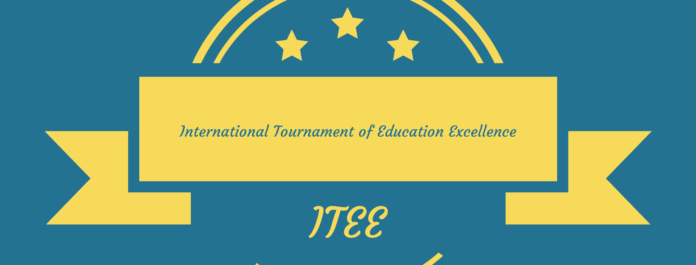The International Tournament of Education Excellence (ITEE)
As of 2023, an estimated 130 million girls under the age of 15 are out of school worldwide. This number includes girls, from primary school age to lower secondary school. The vast majority of these girls (95%) live in developing countries, according to UNESCO.
Knowing about this problem is not enough. Finding a solution is the right thing and the only thing for the empowerment of women.
NJ MED is a Special Consultative Status member of the United Nations Economic and Social Council (ECOSOC) and a partner in the United Nations Sustainable Development Goal (SDG) that focuses on its SDG 4 education mission to “Ensure inclusive and equitable quality education and promote lifelong learning opportunities for all.
NJ MED’s first approach is to find out where the needs are. Then create a way to help. Currently, the United Nations requires countries to submit annual reports on the state of education in their country, which only 22 percent of nations do. So, there is a data problem that needs to be addressed.
NJ MED has created a database on data reported to the UN and data collected by other NGOs.
To encourage nations to submit their data, NJ MED has developed three international education data base competitions to center around the world’s three major sporting events – the Olympic summer games, FIFA’s Men World Cup, and the Women’s World Cup.
During these events, NJ MED will use social media and offline marketing strategies to promote the education competitions. For example, during the Olympic Games (The Global Academic Awards – GAA), we will focus on every nation’s four major education development levels- early childhood enrollment rates, primary school completion rates, lower-secondary completion rates, and high school graduation rates. For the Men’s World Cup Game (The World Education Championship- WEC) we target the nations’ School Life Expectancy, Government Investment in Education, and Adult Literacy Levels.
For the Women’s World Cup (The International Tournament of Education Excellence-ITEE), we are targeting Girl’s Primary and Secondary Completion rates and Women’s Adult Literacy Levels. Our approach is to break through cultural barriers and obstacles in a non-threatening way.
By combining national pride in sports and education, we can draw attention and support to the ITEE goal of help empower girls into strong women.
What is women’s empowerment?
Empowerment means people have power and control over their own lives. People get the support they need that is right for them. Empowerment means that people are equal citizens. They are respected and confident in their communities.
In a world where gender equality remains an ongoing struggle, understanding the implications of a woman without empowerment becomes increasingly crucial. At its core, empowerment involves the provision of social, economic, and political tools that enable women to exercise their rights and make choices freely. It encompasses access to education, healthcare, financial resources, and legal protections, creating an environment conducive to growth and self-determination. Empowerment ensures that women are equipped with the skills, knowledge, and confidence to actively participate in decision-making processes that influence their lives and society as a whole. Let’s take a look at how
Challenges Faced by Women without Empowerment
For women devoid of empowerment, life presents an array of obstacles that hinder personal and collective development. Social and cultural constraints often dictate restrictive gender roles, impeding women’s ability to pursue education, careers, and personal ambitions. These limitations perpetuate a cycle of dependence and thwart the potential for progress. Additionally, the lack of access to quality education and economic opportunities leaves women economically vulnerable and reinforces gender inequalities.
Women without empowerment also face an imbalance of power, with limited decision-making abilities in areas such as health, reproduction, and community affairs.
This power disparity leaves them susceptible to discrimination, abuse, and violence, robbing them of their dignity and agency. Furthermore, the under-representation of women in leadership roles and decision-making positions curtails their influence and hampers the creation of gender-sensitive policies and initiatives.
The Transformative Power of Empowerment
Empowerment acts as a catalyst for positive change, breaking the chains that confine women and enabling them to reach their full potential. By granting women access to education, they become equipped with knowledge and skills, empowering them to make informed choices and pursue diverse career paths. Education provides a pathway out of poverty and equips women with the tools to contribute meaningfully to their families and communities.
Economic empowerment plays a pivotal role in gender equality, as financial independence enhances women’s decision-making capabilities and reduces their vulnerability to exploitation. Access to credit, vocational training, and entrepreneurship opportunities enables women to create sustainable livelihoods, fostering economic growth and eradicating the cycle of poverty.
Empowered women become agents of change within their communities. As they develop the confidence to challenge discriminatory norms, they inspire others to do the same, gradually transforming societal attitudes toward gender roles. Empowerment allows women to advocate for their rights and interests, promoting gender equality on both individual and systemic levels.
Moreover, empowered women contribute to diverse perspectives and innovative solutions, enriching the fabric of society. In politics, business, and community organizations, their representation brings forth a more comprehensive range of ideas, ultimately leading to more equitable policies and decisions that consider the needs of all.
A woman without empowerment is a world deprived of progress.
Empowerment is the antidote to gender inequality, offering women the tools they need to break free from constraints and shape their own destinies. By providing women with education, economic opportunities, and decision-making power, societies can harness their vast potential, fostering inclusive and thriving communities.
As we strive for a future
Overcoming Adversity: Empowering Girls in Africa, Asia, and Beyond for Success in Life
In many regions of Africa, Asia, and other impoverished nations, girls face numerous challenges on their path to empowerment and success. These hurdles, ranging from limited access to education to gender-based discrimination, create formidable barriers.
However, by addressing these challenges head-on and providing the necessary support and opportunities, we can empower these girls to overcome adversity and achieve their full potential. This article explores the various obstacles that hinder girls’ empowerment in these regions and highlights the strategies and interventions crucial to their success in life.
Limited Access to Education
Access to education remains a critical challenge for many girls in impoverished nations. Long distances to schools, lack of transportation, and inadequate infrastructure often make attending school a daunting task. Additionally, cultural norms and societal expectations prioritize boys’ education over girls’, perpetuating a cycle of gender inequality. As a result, girls are denied the fundamental right to education, which hampers their personal growth and limits their future prospects.
Addressing this challenge requires a multi-faceted approach. Governments and NGOs must invest in building schools, providing transportation services, and improving infrastructure to make education accessible to all. Scholarships and financial aid programs can alleviate the burden of educational expenses for disadvantaged families. Moreover, community engagement and awareness campaigns are vital in challenging traditional gender norms and emphasizing the importance of girls’ education.
Gender Bias and Discrimination
Deep-seated gender bias and discrimination continue to impede girls’ empowerment in these regions. Traditional beliefs and societal norms often relegate girls to domestic roles, undervaluing their potential and limiting their opportunities for personal and professional growth. Girls face biased expectations, which can lead to limited access to resources, decision-making power, and participation in public life.
To combat gender bias, it is crucial to foster inclusive and equitable environments that value girls’ contributions. Educating communities about the importance of gender equality and challenging discriminatory practices can shift societal perceptions. By promoting women’s empowerment at all levels, from grassroots initiatives to national policies, girls can break free from the shackles of gender bias and discrimination.
Poverty and Economic Constraints
Poverty acts as a significant barrier to girls’ empowerment, perpetuating a cycle of limited opportunities and denying them the chance to thrive. Families struggling with poverty often prioritize boys’ education over girls’, considering it a better investment. As a result, girls are left with few educational resources and are forced into child labor or early marriages to alleviate financial burdens.
To address this challenge, poverty alleviation measures are essential. Microfinance programs and income-generating opportunities for women can enhance economic independence and provide the means to support girls’ education. Social protection initiatives can provide financial assistance, ensuring that poverty does not hinder girls’ access to quality education.
Early Marriage and Teenage Pregnancy
Child marriage and teenage pregnancy are critical issues that hinder girls’ empowerment and educational attainment. Early marriage disrupts girls’ education, subjecting them to domestic responsibilities and limiting their ability to pursue personal and professional goals. Teenage pregnancy often leads to dropping out of school due to societal stigma and lack of support.
Efforts to address early marriage and teenage pregnancy must focus on empowering girls with comprehensive sexual and reproductive health education. Access to reproductive healthcare services and family planning resources can enable girls to make informed decisions about their bodies and futures. Furthermore, community awareness programs are crucial in challenging harmful practices and promoting the importance of girls’ education and their right to choose their own paths.
Health and Sanitation Challenges
Girls in impoverished regions often face health and sanitation challenges that hinder their educational progress. Inadequate infrastructure, lack of sanitation facilities, and limited access to clean water disproportionately affect girls, particularly during menstruation. Without proper facilities and support, girls may miss school, falling behind their peers and compromising their educational continuity.
To address these challenges, investment in health infrastructure and sanitation facilities is crucial. Providing access to clean water and proper sanitation facilities in schools can ensure that girls have a conducive learning environment. Additionally, comprehensive menstrual hygiene management programs, including access to menstrual hygiene products and education, can empower girls to navigate this natural process without disruption to their education.
Empowering girls in Africa, Asia, and other impoverished nations to succeed in life requires a comprehensive approach that addresses the numerous challenges they face. By ensuring access to education, challenging gender bias and discrimination, alleviating poverty, combating early marriage and teenage pregnancy, and addressing health and sanitation issues, we can create an enabling environment for girls to thrive. By investing in their education, providing opportunities for skill development, and fostering inclusive societies, we unlock the potential of these girls and empower them to overcome adversity, break down barriers, and achieve success in their lives and communities.
Our Solution: The International Tournament of Education Excellence (ITEE)
NJ MED as part of its World Top 20 Project has created three international education competitions to draw attention to the United Nations Sustainable Development Goals education mission – SDG 4.
That focuses on ensuring inclusive and equitable quality education and promote lifelong learning opportunities for all.
The first two competitions – The Global Academic Awards (GAA) and The World Education Championship (WEC) target the development of the nation’s education structures. While, the third – The International Tournament of Education Excellence (ITEE), examines the most under served population (girls) in education systems in a country.
By Leveraging FIFA’s Women’s World Cup: NJ MED’s International Tournament of Education Excellence and Empowering Girls Worldwide
The FIFA Women’s World Cup serves as a global platform to celebrate and elevate women’s achievements in sports. However, its impact extends beyond the field, presenting a unique opportunity to address the challenges faced by girls, particularly those from Africa, Asia, and other impoverished nations. NJ MED’s International Tournament of Education Excellence recognizes this potential and leverages the Women’s World Cup to empower girls through education. The mission of ITEE, highlighting the need to promote education and empower girls worldwide.
Join Us
As the 2023, Women’s World Cup games kickoff this week in Australia and New Zealand. We will compare the education success of girls in the 32 countries competing in the tournament. In hopes to harness the power of FIFA’s Women’s World Cup to address the education challenges faced by girls, particularly those from Africa, Asia, and other impoverished nations.
By leveraging the visibility and excitement of the tournament, the initiative promotes gender equality, invests in educational opportunities, fosters collaboration, and provides inspiring role models. Through these efforts, as the tournament empowers girls to overcome barriers, access quality education, and achieve their full potential. By using sports as a catalyst for change, NJ MED’s initiative creates a brighter future for girls, one where education becomes a transformative force in their lives.
Starting with improving the school completion rate of girls 6 to 14 year old. Followed by addressing the school completion rate of girls 15 to 18 year old, lowering teenage pregnancy, and enhance job skill levels.
Join your national education team or help create an education network for girls in your country. Please, visit https://worldtop20.org/global-movement/ for more information.




